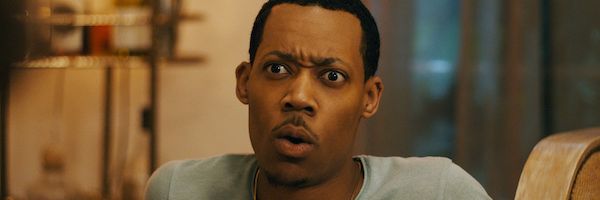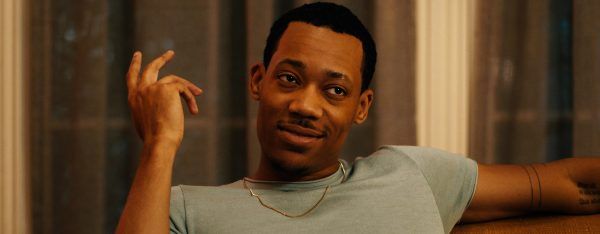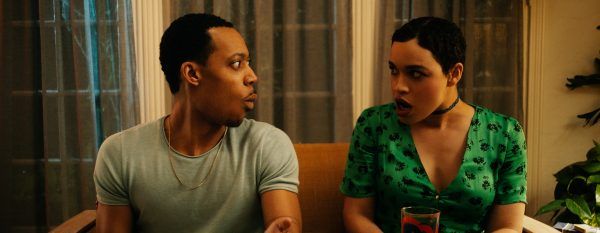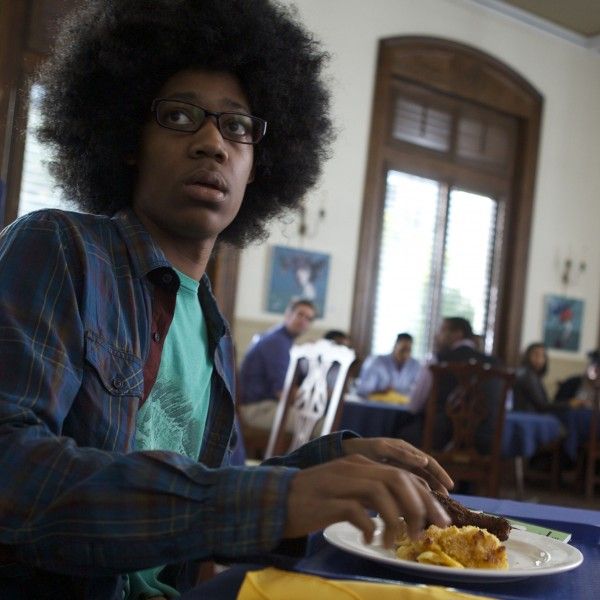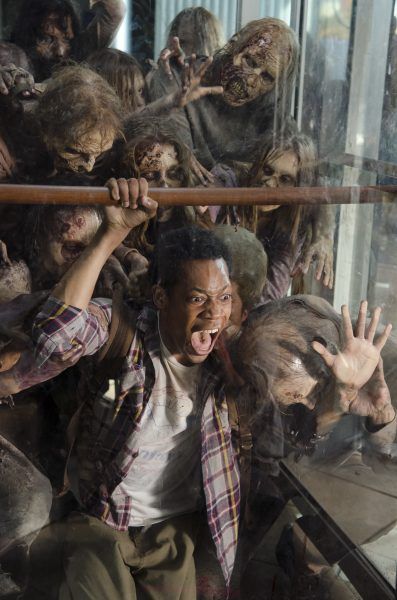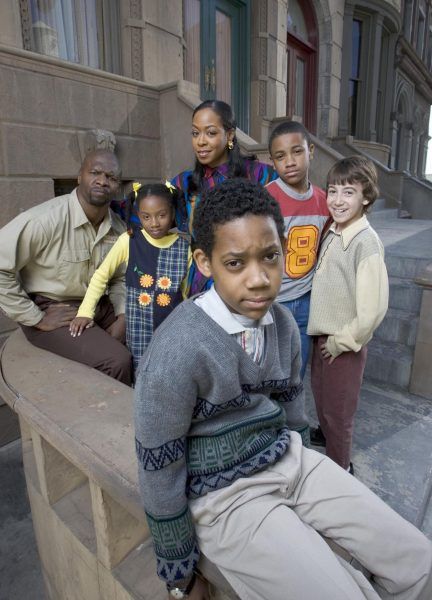It’s happened to all of us. We have an argument with someone we care about, based on something fraught that happened in the past. One person swears one version of the truth, the other swears the other. What actually happened? The Argument, a new indie film from director Robert Schwartzman (The Unicorn), aims to answer this question for a couple as literally as possible.
Jack (Dan Fogler) is a struggling screenwriter. Lisa (Emma Bell), his girlfriend, is an actor who just finished a juicy play with charismatic co-star Paul (Tyler James Williams). When subdued feelings of jealousy and inadequacy swim to the surface during a tense dinner party, the two decide to keep having the same dinner party over and over again, until they can find the truth — or at least the best version of it.
I spoke with Tyler James Williams over a one-on-one Zoom call to get his thoughts on the uniquely theatrical pleasures of The Argument, the struggles in living the same night over and over again, and his fondness for taking the piss out of actors. Plus, we got into the first time he read Dear White People, what it's like to get eaten by zombies on The Walking Dead, and the legacy of Everybody Hates Chris.
Collider: What initially attracted you to The Argument?
TYLER JAMES WILLIAMS: I'd always loved the idea [that] everyone's been in an argument before where you kind of just wish you could run it back, so people could really see what they said and how they felt, because we all would experience arguments from a different perspective when we're speaking versus what we're receiving. And that had been coming up in my life for several years. I was like, "I just wish..." And it feels weird to tell somebody before you get into an argument, "Can I just roll camera really fast so we can just cover all of our bases?" So when I started reading the script and it was a comedy based on that concept, I loved it. You know what I mean? People never really know how they come off a lot of the times, how they're received. And there's just so much comedy in there to play with. That's what actually hooked me from the beginning.
It kind of reminds me of... Do you know that Chappelle's Show sketch where it's the at-home stenographer?
WILLIAMS: Yes, yes, yes, yes. It's just like that. I love that about Jack's character as well, because once he tries to take control of this, it's still going to be seen through his lens. And I grew up with my mother always saying, "There are three sides of the story: Yours, mine, and the truth." And this one is like, "No. There's, like, eight." It's like eight sides of the story, and none of those are the truth. And that's what really excited [me] about this. That, and also, it read like a play. You know what I mean? It really read like a play. And I grew up in New York theater, and you very rarely get a chance to do that, particularly in one, independent film, and then just what film is now in general.
So it was nice to kind of work those muscles because when we prepped it, we prepped it being able to run through a full night in one take. So each one of the nights was supposed to be one full take and that's kind of how we shot it. So that was fun. It was something about not breaking it up and not trying to get to the moment before, actually feeling it all the way through. We rarely get a chance to do that anymore, with theater being primarily handled in New York at this point. And that was really interesting and a fun idea to me.
What was it like rehearsing it more like a play with your castmates and Robert?
WILLIAMS: We took, I believe it was a full week, if not two, to just play with it for about eight hours [a day]. We just don't get that. We don't get that anymore when you're doing a film. Maybe you get a week of rehearsing the big scenes, but not the entire thing. So it was fun to tackle it with the entire cast because your independent prep work became a group collective. From the line learning point of view, it gets so much easier the more you run it with the people in the room. But then also by seeing what they're going to bring to this, it helps you shape your own performance. You know what I mean? Versus when we show up on the day and you didn't know what they would prep, maybe now you're seeing that and you're kind of adjusting on the fly.
I was able to really see, particularly when working with Cleo [Cleopatra Coleman, who plays Williams' girlfriend Trina], for example, them finding out their relationship dynamic as she gets drunker. You know what I mean? That's something I wouldn't have been able to see or know had we not rehearsed it for that much time. So it was really valuable to do. And Robert really came from the perspective of this is just playing. You know what I mean? There's no wrong choice here. We have to make all of this time interesting considering the fact that the dialogue kind of repeats in a lot of ways. So he opened up the house and the creative space for us to try things that under no other circumstances would we have tried. You know what I mean? I'd be like, "No. There's just not time for that." Jumping on and off of furniture and all of that stuff. It took me back to those early days when you're just doing this, not for the money, but just 'cause you really want to play and see what you can get.
Was there anything particularly spontaneous or out of nowhere that you discovered in this playful energy that you're really proud of that made the final cut?
WILLIAMS: Yeah. I think a lot of it came in the third night when everybody else comes in. By that point, we had been shooting for some time, and the core cast was settled so into it that [on the] third night when you had the actors playing us come in, they were kind of carrying that, so our reactions got a lot freer. One of the things was, in that moment, Danny [Dan Fogler] and I found that we had a beef. It was over Cleo's character. We just didn't find that, even in rehearsals, how much he was clocking her and how that began to offend my character. And they kind of start beefing a little bit, but none of them actually wants to fight. There's this kind of back forth that we have where we just kind of say each other's names back and forth at each other aggressively without it ever starting anything. And then I think one of the takes, Cleo just stands up and was like, "Hey, hey, we both have dicks, okay? It's fine. Everyone here has dicks." And that's something that we were playing with in the craziness of repeating this night. We were like, "We're just trying shit, who knows?" But it actually made it, and that was really fun to watch and see.
What were some of the creative challenges that came from being an actor reacting to the same moments, technically, over and over again?
WILLIAMS: Okay. So there were several. (laughter) There were several. One of which was finding ways to get your character to realize something's going on without giving that away. Like watching Jack repeat phrases and slowly catching on to what was happening, although for us [as actors], we very clearly know, and we just did this literally yesterday. And then there's this other idea of the psychology behind what happens when someone becomes aware that they're reenacting something that they did? How do they re-edit their own performance? So there was the character within the character. I forgot what experiment it was, but it pretty much says, "Once people are aware that they're being filmed, you'll never get an actual portrayal of who they are." That was really interesting to play with. [Dan Fogler's Jack is] a character who's not an actor, who's going to have to put on an act for how they feel like they are, but then with mine and Emma's character specifically, they were actors as well. So there was the actor version of them, the regular version of them, then the "I'm trying to revise myself" version of them. So we prepped almost three characters, and that was uniquely different and difficult for this, and I think is what really stretched me, for example, of not just "How am I going to interpret this? And how would I portray this version of myself?" But how would he portray this version of himself as he's formulating his own opinions about things that he actually said? That was very unique to this experience.
But it's kind of what we do. You know what I mean? It's kind of like the bit of the character within the character, the secrets that they have and all of that. And then I think towards the end, when they put the play on again, now it's the fourth layer of the character. (laughter) It's like, now I am the actor playing myself, playing the revision of myself, playing that character. And you're so far deep into it. But that's what made this fun.
And on top of all of those different levels and layers, there is the meta element of you being an actor, playing an actor. What is it like to play someone else that's so closely aligned to your profession?
WILLIAMS: To me, what's so great about it, and I've done it one other time before for a friend's short film: I love making fun of actors. Because we're so weird. (laughter) We're just so weird, but we have to take what we do so seriously. But so many times when we do that, we don't realize how strange we look. Like when actors do acting exercises, we look insane. That was fun to me. It's like, "Hey, I'm going to make fun of my own community at this point." And I think that's something that is necessary for understanding what we do and how we come off to the world. We have to understand that, although what we do, we take very seriously and these moments really mean something to us, in the grand scheme of the world, it doesn't mean literally anything. (laughter) No one gives a shit. So that was really fun, getting into something that means something so much to a character, but understanding in the totality of the world this doesn't mean anything here. And the stakes of this movie are very high, but it's really just a small argument within a group of friends that doesn't even need to happen, really. And that's pretty much what pretty much being an actor is. Manufacturing drama out of small moments that no one else really cares about.
When I first saw Dear White People, I thought it was such a vital lightning bolt and such a surprise, such a voice I'd never really seen before. What was it like the first time you read that script for the film?
WILLIAMS: I remember it like it was yesterday. I was sitting at my dining room table in an old apartment. And the minute I put it down, I looked at my girlfriend at the time and said, "I literally have to do this movie. I have to. There's no other option. I have to do it." It was so refreshing. It was so clear that Justin Simien's voice was going to be a voice that was going to be resonating for some time. It was ushering in this kind of new renaissance of Black Hollywood that I felt needed to happen. We were kind of getting stuck. And then as I continued to delve deeper into the project and those who were behind it, most people don't realize one of the EPs for that movie was Lena Waithe. Ain't nobody knowing who this Lena Waithe is yet. You know what I mean? There were so many people who were primed and ready to pop. Tessa Thompson.
Every actor, I think, in some way, shape, or form, has these kind of pinnacles that we're looking forward to. And I remember her talking at the time with us not knowing, "Are we going to ever be able to do those kinds of big franchises?" And I'm sitting in the car with her, we were on our way to the Mall of America because we shot it in Minnesota. And I was like, "Tessa, I feel like you're one role away from just taking off." And then sure enough, there it was. It's one of those serendipitous things that it feels like the universe is handing you on a platter. And that's how it felt when I read it. "You have to do this. If you don't, it will be one of the biggest regrets of your career." And everybody who works on it, this is going to be like... You go back and you watch Do the Right Thing and you realize how many careers jumped off from that. This was one of those projects.
It's interesting now because nobody knows we did that. (laughter) I bring up Dear White People, they were like, "Oh, were you in that? What season?" I'm like, "No. I did the movie that started the — Never mind." Very few people actually remember that there was a movie and that we did it because the show has become so big now. But for me, I'll say it over and over and over again, that was the turning point of my career. Dear White People. For sure.
You do show up on the TV show, but in a different role, which is so interesting. What is that process like? What is it like being in a similar universe, but as a different communication of that universe?
WILLIAMS: It was super fun. It was just really incredible. Because I hadn't worked with Justin really since [the movie], because he had just kind of been forging forward with the show. So to be able to work with somebody where there's such a mutual grounding respect is very rare in the sense of like, "Yeah. We're now coming back to work on this thing that we built together". And it's so fun to do it with Tessa as well. Those are the ones that [are] like, "I'll do these things for free. I'll do this over and over and over again for free." It edifies my creative soul so much.
And then there's also this moment: I remember he was walking me around the set, and I remember when we shot the film for... I don't even think it was $1.2 million. I'm not even sure we got that. We had such a hard time getting locations and making it look like a school. And we really struggled with that, in true indie film fashion. And now walking around a studio and a soundstage with the whole school built out, and I'm like, "What is this world that I'm in now that wasn't here before?" And it just kind of flourished and grew with so many characters and people that came from the film that we shot that were local hires, who now have full-fledged acting careers. It blew my mind.
So it was fun to come play in it, but I also loved the fact that it wasn't uniquely mine anymore. It was somebody else's. And that's kind of like raising your children, right? You raise your kids, and then their lives are theirs and you get to watch it from the perspective of, "I poured into this, but this isn't mine. This is its own entity by itself." That was really, really interesting to experience. And then to also have a conversation with DeRon [Horton] who took over the role, and be like, "This is yours now. This is a completely different interpretation of this. You fleshed him out further than I could. I laid a groundwork. Now you've had a show to do that." Cathartically, it just does something for you as an artist, to pass your art onto somebody else and see what they do with it, and how much bigger and better it comes. That's the purpose of our community.
On a lighter note, I just want to know what it's like to get eaten by zombies in an episode of The Walking Dead.
WILLIAMS: Y'know, y'know... That took me a while to really process. (laughter) And it's interesting because with The Argument, there's so many Walking Dead actors.
And there's a linchpin of a zombie movie in it as well.
WILLIAMS: Yeah, I'm like, "What is this about the zombie world that keeps pulling us in here?"
There are two ways to break that down, right? There's the technical version of it. Getting eaten by a zombie technically? Very difficult. Very, very difficult. There are squibs everywhere that need to pop at certain times. You're getting bitten, but you don't feel it. You kind of have to, out of the corner of your eye, be able to see when the bite happens so you can react to it in real-time, but you don't feel it. You don't really feel anything. And that's what's technically difficult about it. And then also looking at an actual bust of yourself is weird. I've really kind of struggled with that briefly in the van ride on the way over, because you only see a mirror image of yourself, ever. And I'm looking at directly me, and that was strange. And a screaming position is very, very strange.
But on an acting, emotional level, I've never really had an experience like that. And it's one that kind of bonded Steven Yeun and I for, I think, life — in the sense of, I've never been able to kill a character and let them die and experience that with them in a very traumatic way. And one of the things that happened afterwards... We do the scene, and we have to do the moment where I get slammed against the glass. And that has to play all the way out because we would talk and I was like, "There's no way I can jump and cut into just [a] scream. This is somebody's last guttural death. We have to play this whole beat out." And we played the whole beat out. They called cut. And then I just kind of collapsed and sobbed for two minutes on set.
And Steven just kind of had to sit there, and he put a hand on my back and he just started kind of whispering in my ear, "You're letting him go. It's a beautiful thing. You really gave him a death." And it was a mourning process that came immediately after we [called cut]. Because there's only one take at that. You only get one. Because once I'm covered in blood and all of that, the fake stuff is different, then we have to throw in a double. You get one shot at it. And since then, I've died in several things. They love killing me. They love killing me in things. And each time it's different. But that one was the first one, and it was unique and it was beautiful. And it was one of the most edifying moments in my career. And it bonded me with everybody in that room at the time.
And also, everyone showed up, which was really interesting. Alanna Masterson, Lauren Cohan, Christian Serratos, they all showed up for the death. Almost as if it was a funeral... And that's what actually pulled me to Whiskey [Cavalier], and I've told my managers, agents this, and honestly, any producers should hear it, probably, if they want to get me to do their project, get me one of those people who was in that room. I will for sure do this. Without question. Without question, I'll do whatever your project is. Because they were part of that. So emotionally and mentally, it was otherworldly. Technically, very difficult. But emotionally and mentally, otherworldly.
Everybody Hates Chris is a very special show to me, and for so many people. What do you think the legacy of that show is? And do think there's ever a world where you would want to revisit that role or have a reunion of that cast?
WILLIAMS: What's really interesting, and what [series co-creator] Ali LeRoi did a beautiful job at is, he took a family and wrote them into this lens of Chris Rock's kind of stand up. But what he did was he made a family that resonated with everybody across multiple racial backgrounds, ethnicities, nationalities. Although it's specifically set in New York in the 80s, the way it resonates in Brazil, particularly, is interesting. All of my social media numbers are just Brazilians. It's ravaged. They love, love that show. And it's so interesting to me because it's a very specific story, actually. It's about being a Black kid growing up in New York, in Brooklyn, in the '80s. But he was able to write something that was so universally understandable and acceptable, and that people from all walks of life can just relate to as an experience. And that's what I honestly really think the legacy is.
At the time we were on UPN when we first came out, which was a notoriously just kind of Black network. And we were considered a Black show for a Black audience. But once it hit syndication, I think a lot of people found that it had a much wider appeal than was immediately expected. And that's kind of the beauty of Dawn Ostroff, who was the president of UPN at the time, and then also moved over to the CW, she saw that this could be universally accepted. And although our numbers weren't particularly good for the three seasons after the first big one, they kept it going because they understood in syndication, this will resonate. So I think that kind of plays into the greater legacy of it all. It was just a timeless show that wasn't necessarily built to be that. It just shows how stories, regardless of what the lead looks like or what era you set it in, if you make it a relatable story, people will gravitate to it.
And as far as a reunion goes, we've talked about it several times. Ali, Chris, and myself have kind of kicked around different ideas at different periods of time as to what could happen. I think in, I want to say 2019, we got close. We got close. And then it just kind of... People keep getting other jobs and it gets harder to get done. Maybe one day. You know what I mean? Maybe one day we will. We've talked about it. But hopefully one day we get a chance to do that and kind of expand on that story. But I think what gets difficult in that is we want to maintain the legacy of making this a completely relatable show. And as we get into talking [Chris Rock's] older years of life, the trajectory of the story gets a little less relatable of "Now it's specifically a comic in Hollywood," and that kind of thing. So I think that's the struggle that we all run up against.
Also, the fact that everyone really jumped off and had beautiful careers after that. Tichina [Arnold]'s been working, Terry [Crews] has been working, Vincent [Martella] has been just doing all of the Phineas and Ferbs, just literally all of them. Tequan [Richmond]'s over on Boomerang now. So getting everybody together is going to be difficult as well because, thankfully, that was a lot of good jump-off points for careers. But I'm not opposed to it. And I've said that before, I'm not opposed to it. If we can get the right story and it really works, then it would be beautiful. It would really be beautiful. But I think the goal is to make sure that it does the same thing that it did before. It breaks down boundaries. And it lets people know that this show can resonate to everybody. Always. And I think that's the fight that we're kind of having in Black Hollywood right now in that kind of renaissance of, it was understood before this that you had to have a white male lead in order for it to resonate across the board. And now we're showing it doesn't have to be. Everyone can, not only participate and enjoy, but feel connected to these characters. And I think that's the goal that we would need to have going into it.
The Argument is in virtual theaters and on VOD now.

